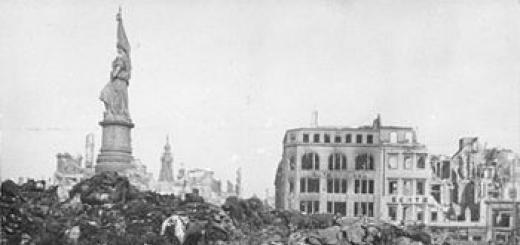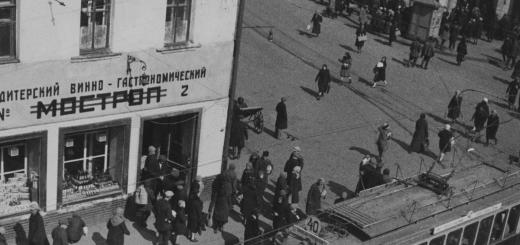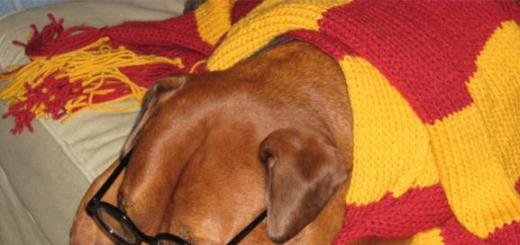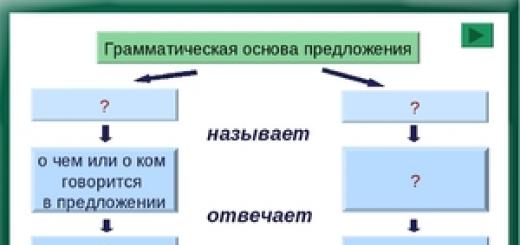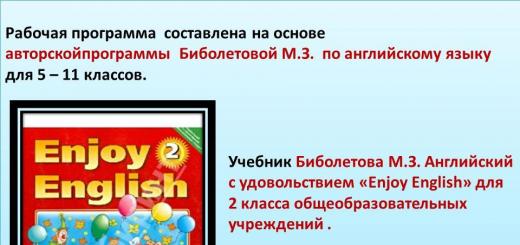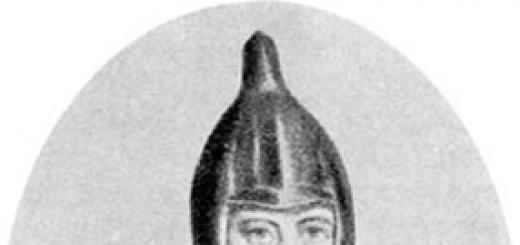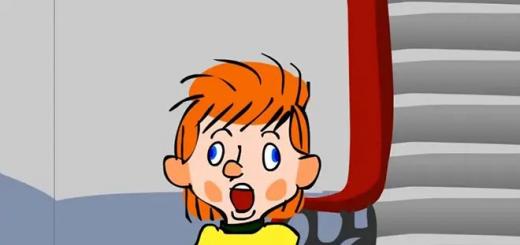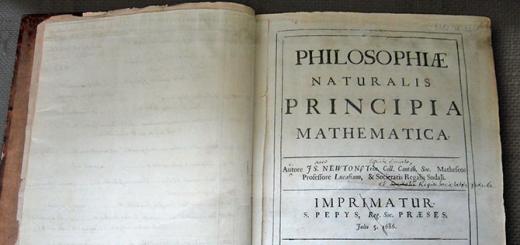Among the public buildings in a certain city, which for many reasons it would be more prudent not to name and to which I will not give any fictitious name, there is a building that has long been found in almost all cities, large and small, namely, the workhouse. The workhouse is a charity home (orphanage) for the poor in England. The picture drawn by Dickens in the novel realistically reproduces the organization and order of English workhouses with their prison regime. And in this workhouse was born - I need not bother to give the day and date, as it is of no importance to the reader, at least at this stage of the story - was born a mortal whose name precedes the beginning of this chapter.
When the parish doctor parish doctor- a doctor who is in the service of the "parish". In England, a parish used to be a district headed by the church authorities appointed a priest with the right to levy taxes from the population in favor of the state Anglican church. But over time, a parish began to be called a small area in cities and rural areas, the economic life of which was subordinated to an elected council of citizens. In the Dickens era there were fifteen and a half thousand parishes in England. Workers and peasants were not allowed to manage the affairs of the parish, because only residents with a high property qualification had the right to vote. The terms of reference of the parish authorities also included the organization of the so-called "help to the poor", that is, a workhouse, where only those residents of the parish who had lost all hope of improving their living conditions decided to enter. brought him into this world of sorrow and sorrow, for a long time it seemed very doubtful whether the child would survive to receive any name; in all probability these memoirs would never have been published, and if they had, they would have occupied no more than two or three pages, and, thanks to this priceless quality, would have been the shortest and most truthful example of a biography that has survived in the literature of any century or any countries.
Although I am not inclined to say that being born in a workhouse is in itself the happiest and most enviable fate that can befall a man, nevertheless I believe that, under the circumstances, it was the best thing for Oliver Twist. For it was very difficult to get Oliver Twist to take care of his breathing, and this is a troublesome task, although custom made it necessary for our painless existence. For some time he lay panting on a woolen mattress, in an unstable balance between this world and the next, and decisively leaning in favor of the latter. If during this short period of time Oliver had been surrounded by caring grandmothers, anxious aunts, experienced nurses and wise doctors, he would inevitably and undoubtedly be ruined. But since there was no one around, except for a beggar old woman, whose head was clouded from an unusual portion of beer, and the parish doctor, who performed his duties under the contract, Oliver and Nature won the battle together. As a result, Oliver, after a short struggle, sighed, sneezed, and announced to the inhabitants of the workhouse about the new burden that lay on the parish, uttering as loud a cry as one could expect from a male infant who, three and a quarter minutes ago, received this very useful gift - voice .
As soon as Oliver discovered this first evidence of the proper and free activity of his lungs, the patchwork quilt carelessly thrown on the iron bed stirred, the pale face of the young woman lifted from the pillow, and a faint voice slurred:
Let me look at the child - and die.
The doctor was sitting by the fireplace, warming and rubbing his palms. When the young woman spoke, he stood up and, going to the headboard, said more affectionately than could be expected from him:
Well, it's too early for you to talk about death!
Of course, God forbid! the nurse intervened, hurriedly stuffing a green bottle into her pocket, the contents of which she savored with obvious pleasure in the corner of the room. - God forbid! That's when she lives as long as I lived, sir, and give birth to thirteen children, and two of them will live, and even those will be with her in the workhouse, then she will come to her senses and will not take everything to heart! .. Think, dear, about what it means to be a mother! What a cute baby you have!
Apparently, this comforting prospect of motherhood did not make the right impression. The patient shook her head and held out her hand to the child.
The doctor passed him into her arms. She passionately pressed her cold, pale lips to his forehead, passed her hand over her face, looked around wildly, shuddered, leaned back ... and died. They rubbed her chest, arms and temples, but her heart stopped forever. Something was said about hope and comfort. But she didn't know that for a long time.
It's over, Mrs Tingami! the doctor finally said.
Yes, it's over. Ah, poor thing! the nurse confirmed, picking up the cork from the green bottle that had fallen on the pillow as she leaned over to pick up the baby. - Poor thing!
She was brought here last night, - the old woman answered, - by order of the warden. She was found lying on the street. She came from afar, her shoes are completely worn out, but where and where she went - no one knows.
The doctor leaned towards the deceased and raised her left hand.
Old story,” he said, shaking his head. - No wedding ring... Well, good night!
The worthy physician went to dinner, and the nurse, having once again kissed the green bottle, sat down on a low chair by the fireplace and began to dress the baby.
What an excellent proof of the power of clothing was young Oliver Twist! Wrapped in a blanket, which was hitherto his only cover, he could be the son of a nobleman and the son of a beggar; the most well-born person could hardly determine his proper place in society. But now, when he was dressed in an old calico shirt, yellowed with time, he was marked and labeled and immediately took his place - a parish child, an orphan from a workhouse, a humble poor man of the stock, passing his life under a hail of blows and slaps in the face, despised everyone and nowhere meeting pity.
Oliver screamed loudly. If he could have known that he was an orphan, left in the merciful care of church elders and overseers, perhaps he would have shouted even louder.
Oliver Twist is a boy whose mother died in childbirth in the workhouse. He grows up in an orphanage at the local parish, the funds of which are extremely meager. Starving peers force him to ask for supplements for dinner. For this obstinacy, the authorities sell him to the undertaker's office, where Oliver is bullied by the senior apprentice. After a fight with an apprentice, Oliver flees to London, where he falls into the gang of a young pickpocket, nicknamed the Artful Dodger. The cunning and treacherous Jew Fedzhin (Feygin) is in charge of the den of criminals. Cold-blooded killer and robber Bill Sykes also visits there. His 17-year-old girlfriend Nancy sees Oliver as a kindred spirit and is kind to him. The plans of the criminals include teaching Oliver the trade of a pickpocket, but after a failed robbery, the boy ends up in the house of a virtuous gentleman, Mr. Brownlow, who eventually begins to suspect that Oliver is the son of his friend. Sykes and Nancy bring Oliver back to the underworld to take part in a heist. As it turns out, Monks, Oliver's half-brother, is behind Fagin and is trying to disinherit him. After another failure of the criminals, Oliver first ends up in the house of Miss Rose Maylie, who at the end of the book turns out to be the hero's aunt. Nancy comes to them with the news that Monks and Fagin are not parting with the hope of stealing or killing Oliver. And with this news, Roz Meily goes to Mr. Brownlow's house to resolve this situation with his help. Oliver then returns to Mr. Brownlow. Sikes becomes aware of Nancy's visits to Mr. Brownlow. In a fit of anger, the villain kills the unfortunate girl, but soon he himself dies. Monks has to reveal his dirty secrets, come to terms with the loss of his inheritance and leave for America, where he will die in prison. Fagin goes to the gallows. Oliver lives happily in the home of his savior, Mr. Brownlow. Oliver Twist - a boy whose mother died in childbirth in the workhouse . He grows up in an orphanage in the local parish , whose funds are scarce . Starving peers make him ask for supplements to dinner. For this obstinacy sells his superiors in the undertaker "s office , where Oliver is being bullied senior apprentice . After a fight with a journeyman Oliver flees to London where he gets into a gang of young pickpockets , known as the Artful Dodger . Den of criminals bosses cunning and wily Fagin the Jew (Feigin) . There also visited by a cold-blooded murderer and robber Bill Sykes . His 17 -year-old girlfriend Nancy Oliver sees a kindred spirit and shows him kindness. The plans include the training of offenders Oliver craft pickpocket , but after the boy gets lost by- robbery in the house of a virtuous gentleman - Mr. Brownlow , who eventually begins to suspect that Oliver - the son of his friend . Sykes and Nancy Oliver's return to the world of the criminal underground, so that he took part in the robbery. As it turns out , is for Fagin Monks - half-brother Oliver, who is trying to deprive him of his inheritance . After another failure criminals Oliver first enters the house Miss Rose Meili , at the end of the book turns out to be the aunt of the hero. They Nancy comes with the news that Monks and Fagin not give up the hope to steal or kill Oliver . And with the news of Roses Meili goes to the house of Mr. Brownlow , to resolve with the help of this situation. Oliver then returned to Mr. Brownlow. About Nancy visits to Mr. Brownlow learns Sykes. In a fit of anger villain kills the unfortunate girl , but soon killed himself . Monks have to open up their dirty secrets come to terms with the loss of inheritance and go to America , where he would die in prison. Fagin goes to the gallows. Oliver happily lives in the house his savior Mr Brownlow .
1. What do you know about the history of Oliver Twist? Read the biography to find out.
Charles Dickens
(1812-1870)
Born in Portsmouth, but his family moved to London when he was ten years old. Later, he went to work in a factory to pay rent and support his family, as his father was in prison for non-payment of debts. The release of his father and the improvement in the family's fortunes put things right, but Dickens never forgave his mother for leaving him at the factory. He first made a name for himself as a writer in his twenties with The Pickwick Papers (1836).
The work of Oliver Twist (1837-1839) is about a boy born in a workhouse for the poor. Some other boys made him beg for more food. As a result, Oliver was then sold. Suffering from terrible cruelty, he runs away and joins a young criminal who teaches him how to steal a wallet. The overall theme of the novel is that of selfishness and dishonesty, as most people cheat on Oliver. Few people show him love and kindness.
2. Listen and read the text on pages 108-109. Choose the correct answer (A, B, C or D) for questions 1-5.
1. At every meal, boys...
A) were happy to receive one spoonful of porridge.
C) had to wash bowls and spoons.
C) wanted to eat more.
D) tired of cleaning fingers from food.
2. A tall boy whose father was a baker...
A) was more hungry than the other boys.
C) used to this kind of life.
C) was afraid of what hunger might do to him.
D) was afraid of the night.
3. Before they could eat, the boys had to...
A) give your bowls to the owner.
c) Take your chairs at the table.
C) distribute food.
D) read a prayer of thanksgiving.
4. The boys decided that Oliver would be the one who...
A) elbow the owner.
C) will distribute porridge.
C) will ask for another portion.
D) walks along the table.
5. When Oliver asked for more, the master...
A) was shocked.
C) lost his voice.
C) became paralyzed.
D) turned white with fear.
Oliver Twist
The boys in the workhouse (a house where the poor lived and did thankless work for food) ate in a large stone hall. At one end was a cauldron, from which the owner distributed porridge during meals. Each boy had only one full spoon and no more, except on holidays, when they were given two ounces (56 grams) of porridge and a quarter of bread.
The bowls never needed washing as the boys polished them with their spoons until they shone. When they do this, they will sit staring at the cauldron with eager eyes, as if they could easily eat even the very bricks of which it was made. Meanwhile, they licked their fingers, trying to find any random bits of porridge.
In general, the boys have an excellent appetite and Oliver and his friends suffered from slow fasting for three months. They finally became so wild with hunger that one boy, who was somewhat tall for his age and not at all accustomed to such food, because his father owned a small bakery, told his friends that if he did not have one more spoonful of porridge daily , he was afraid that one night he might eat the boy who slept next to him. He seemed to have a wild, hungry look, and the others completely believed him. A meeting was held and a lottery was held to see who should approach the host after dinner that evening and ask for more. The task fell to Oliver Twist.
Evening came and the boys took their places. The host, in his cook's apron, stood by the cauldron with his assistants behind him. The porridge was distributed and a long prayer was said. After the porridge was over, the boys whispered to each other and winked at Oliver while his neighbors nudged him. Oliver was desperate with hunger and suffering. He got up from the table and, approaching the host with his bowl, said:
"Please sir, I want some more"
The owner was a fat, healthy man, but he turned very pale. He stared at the boy in amazement for a few seconds and then leaned on the cauldron. His assistants were paralyzed with surprise, and the boys with fear.
"What?" said the master in an ultimately feeble voice.
"Please, sir," replied Oliver, "I want some more."
The owner hit Oliver on the head with a ladle, grabbed him tightly and loudly called the policeman.
3a. Match the underlined words with their meanings below.
work amazement cry, scream
friends completely unable to move
3b. Explain the underlined words/phrases. Select some and show or draw their meanings.
4. Which sentence in the text do you think best describes the picture?
5b. Use the verbs above to say how you will look in the following situations:
1. at your neighbor through closed curtains
2. look at yourself in the mirror
3. on the clock to see what time it is
4. someone who interrupts you during your performance
5. headlines in a hurry
6. someone in very unusual clothes
6. Complete the idioms using the words given in the list. Check the list of words Are there similar idioms in your language?
(tea, cake, water, cucumber, milk)
1. Now he is in serious trouble. He is really in trouble (literally: hot water).
2. Ann is always calm and does not worry about anything. She is also unflappable (literally: cool as a cucumber).
3. You can do it. It's easy. This is a trifling matter (literally: a piece of the pie).
4. You can't change anything now. Tears will not help grief (Literally: do not cry over spilled milk).
5. I really don't like going to the theatre. This is not to my taste (Literally: not my cup of tea).
7. Portfolio: Write an article to describe what you think happened when the cop arrived. Compare with your partner's results
Original texts translated above:
Charles Dickens
(1812-1870)
I was born in Portsmouth, Hampshire.
but his family moved to London ^ when he was ten. He later went to work in a factory to pay lor his accommodation
and support his family as his father was in prison for not paying his debts. His father’s eventual release and an improvement in the family’s fortunes helped matters, but Dickens never forgave his mother for leaving him in the factory. He first made a name for himself as a writer in his twenties with The Pickwick Papers (1836).
Oliver Twist (1837-1839) is about a boy born in a workhouse for the poor. Some of the other boys make him ask for more food. as a result. Oliver is then sold. Suffering terrible cruelty, he runs away and joins a young criminal who teaches him how to steal wallets. The general theme of the novel is that of selfishness and dishonesty as most people take advantage of Oliver. Few people show him love and kindness.
Oliwvr Twist
The boys al (he workhouse" ale in a large
stone hall. At one end there was a copper2, out of which the master ladled3 gruel4 at mealtimes. Each boy had only one ladleful and no more, except on public holidays when he had two ounces5 and a quarter of bread.
The bowls never needed washing as the boys polished them with their spoons until they shone. When they had done this, they would sit staring at the copper with such eager eyes as if they could easily eat the very bricks of which it was made. Meanwhile, they licked their fingers trying to catch any stray splashes of gruel.
Generally, boys have excellent appetites and so Oliver and his companions suffered from slow starvation for three months. They finally got so wild with hunger that one boy, who was somewhat tall for his age and not at all used to that sort of thing because his father had owned a small bakery, said to
his companions that unless he had another spoon of 20 gruel daily, he was afraid that one night he might eat the boy who slept next to him. He seemed to have a wild, hungry look in his eye and the others entirely believed him. A meeting was held and lots were drawn to see who should walk up to the master after 25 supper that evening and ask for more. The task fell to Oliver Twist.
The evening arrived and the boys took their places. The master, in his cook's apron, stood beside the copper with his assistants behind him. 30 The gruel was served out and a long grace6 was said. After the gruel disappeared, the boys whispered to each other and winked at Oliver, while his neighbors nudged him. Oliver was desperate with hunger and misery. He rose from 35 the table and. walking towards the master with his bowl, said,
"Please, sir, I want some more.'
The master was a fat, healthy man but he turned very pale. He gazed in astonishment at the boy for 40 some seconds and then held on to the copper for support. His assistants were paralysed with wonder and the boys with fear.
‘What?’ said the master eventually in a faint voice. 45
‘Please, sir,’ replied Oliver, ‘I want some more.’
The master hit Oliver's head with the ladle, held him tightly in his arms and shrieked aloud for the policeman.
Oliver Twist is a story adapted from the original story about a mild-mannered orphan boy whose life is like a roller coaster. From birth, he knows feelings of cold, hunger and humiliation. In the orphanage, he was considered obstinate, allowing himself the audacity to ask for supplements as a youngster, and was sent to serve as an undertaker. Here the conditions are no better, in addition, Oliver is regularly beaten by the boy Noe. Once, having given a worthy rebuff, the young apprentice runs away and, by the will of fate, ends up in London. Here he meets a thief. He takes him to the lair of the thug and bandit Dawkins. Feigin, the leader of the murderers and thieves of the city and the entire outskirts, has his own views on the boy.
But the blessing of heaven descended on Oliver, he meets the virtuous Mr. Brownlow, and later finds himself in the house of his aunt, about whose relationship he has no idea. The appearance of a relative is not to the liking of Oliver's half-brother Monks. He in every possible way blocks the path to a decent life for the unfortunate orphan, betraying him into the hands of Feigin. As a result, Oliver remains to live with Mr. Brownlow, and the attackers go to jail and to the gallows.
in English
Yakovleva Marina Sergeevna
Introduction
This screenplay is based on an adaptation of J. Dooley's version of Charles Dickens' novel Oliver Twist.
The theatrical performance is the final stage of the project activity on the topic "Outstanding English writers: Charles Dickens".
Work on the project was carried out at English lessons (home reading) for several months. When reading the work, special attention was paid to pronunciation and intonation. The students acted out dialogues and individual scenes from the book even before the performance. In the future, the project participants themselves selected future performers of the roles.
Preparation for the performance and the theatrical performance itself within the framework of this project creates the maximum conditions for the manifestation and development of the creative artistic abilities of students.
Working on a project develops imagination, fantasy, collective responsibility for the result of joint activities and brings satisfaction to students who see the product of their own work.
Such forms of presentation as a theatrical performance are also part of the speech practice and the integrative development of communicative skills of foreign language speech communication as a kind of work to maintain the achieved level, improve and deepen the preparation of students.
The presented scenario can be used as part of extracurricular work on the subject.
Introduction
|
Hey Jane! I haven't seen you for ages! |
|
|
Hello Mike, glad to meet you. |
|
|
Are you in a hurry? I'm going to have a snack. Will you join me? We can chat a little. |
|
|
With great pleasure but not today. I`m to learn my part for our school play “Oliver Twist” by Charles Dickens. |
|
|
Really! It's great! I'm sure it's a kind of a tearful love story. |
|
|
Nothing of the kind! It's about a small boy, whose mother had died in a workhouse giving him birth. His life was very hard and full of mystery. |
|
|
And what is “workhouse”? |
|
|
“Many years ago in England there were special places called workhouses, where poor people went to live when they had no money or work, no families. Most of them had nowhere else to go. They worked for food and shelter”. |
|
|
Oh how interesting! I like history. Charles Dickens is buried in Westminster Abbey isn't he? |
|
|
You're right he is. |
|
|
I was in London last year and I saw his grave. But I haven't read any of his books. |
|
|
I've got only one at home. And it's "Oliver Twist". |
|
|
call me tomorrow. |
|
|
Done. Good-bye, Jane. |
|
Mr. Brown, a doctor (or Mrs. Brown)
A room in a workhouse. Sally is sitting with the doctor at the table, drinking tea.
|
What awful weather it is today! |
|
|
It's a real storm Sally |
|
|
Some more tea doctor? |
|
|
Oh, no, thanks. How long have you been living here Sally. |
|
|
For fifty years, Mr. Brown, for fifty years. And it wasn't an easy life, believe me. The knock at the door |
|
|
Don't you hear? |
|
|
Somebody has knocked at the door. |
|
|
Who is there I wonder? They open the door and help the young woman in. |
|
|
Come in dear. Feel at home. It's a very bad idea to go out of the house in such bad weather The woman faints. |
|
|
Oh, my God, she is pregnant! The woman comes to herself |
|
|
Don't be afraid, dear. Your child will be born soon, don't worry! Boil some water Sally. I'll prepare everything. Doctor goes out. |
|
|
I've had thirteen children and I've often helped the doctor when a child was born. Close your eyes now and try to rest. |
|
|
My good woman, help me, please The woman takes off the gold chain with a locket Take these things… please, keep them safe for my child… I’m very sick! I don't think I'll live to see the baby. Sally puts the chain into her pocket |
|
|
Don't talk like that. You'll need all your strength for the birth! |
|
|
Come with me dear, you mustn't think about dying. |
|
|
Doctor takes the woman to another room. After some time the baby`s cry is heard. Doctor comes out with the baby in his hands. He gives the baby to Sally |
|
|
“Well Sally, I'm afraid there's nothing more I can do here. She died. She was too weak. Where did she come from? |
|
|
I don't know, but she walked a long way to get here. Her shoes were worn out.” |
|
|
And the baby's father? |
|
|
We don't know anything about him. May be he's dead. She arrived here alone. |
|
|
Poor girl! I have to prepare everything for the burial. Till tomorrow Sally. |
|
|
Good bye, doctor. Sally looks at the child and puts him in a cradle. She sits down and takes the chain and a locket out of her pocket. What have we got here? Oh, two locks of hair… two portraits and a wedding ring… “A very sad story. Poor baby… I'm sorry, but I'm going to keep these things and sell them myself. Then I can have a bit of money now that I'm old.” |
Scene II
a manager of the
workhouse Mr. Sowerberry, a coffin maker
Oliver Twist Clara, his wife.
Master (or mistress) Noah the boy who works with the coffin maker.
Nine years passed. Mr. Bumble brings Oliver to the men's workhouse
|
Now Oliver you begin a new life. I'm Mr. Bumble the manager of the workhouse. Your surname will be … Twist. Oliver Twist. Well, a nice name, isn't it? |
|
|
Yes, sir. I like it. |
|
|
You must know that I'm very, very strict. If anyone in the workhouse does anything wrong, I hit them with this stick He shows Oliver a stick |
|
|
What, I don't hear! |
|
|
Yes, sir, I see it. |
|
|
Well… Every day you’ll get a bowl of soup and a piece of bread on Sundays. Be a good boy. |
|
|
What, I don't hear! |
|
|
I'll be a good boy, sir. |
|
|
Go, then, this young man will show you your place. Oliver is brought to the dining room |
|
|
Hi, Oliver. Welcome to our hell. Have you got anything to eat? |
|
|
No, I'm hungry myself. We never had enough to eat in another house and never heard a kind word there. I hoped that it would be better here. |
|
|
Better? The soup they serve is mostly water. We eat bread only once a week and it is so dry that we can break our teeth. |
|
|
We are so hungry that we decided that someone had to ask for more food. |
|
|
If one boy gets more soup we can all get more. Let's draw lots. The boys pull sticks Well, you are to do it Oliver Master of the workhouse appears Dinner! You, young bastards, dinner! Master serves the soup, the children swallow the soup at once |
|
|
Go on then Oliver, ask for some more! Oliver holds out his bowl |
|
|
Please sir. I want some more |
|
|
Please, sir, I'm hungry I want some more. Master hits Oliver with his soup spoon. |
|
|
Mr. Bumble, Mr. Bumble! |
|
|
What's the matter Master? |
|
|
Oliver Twist wants more soup! |
|
|
“What?! I can't believe my ears! No one has ever asked for more! Oliver Twist, you are a bad, ungrateful boy! I'll lock you in a dark cellar with rats!” Mr. Bumble takes Oliver away shaking him. He puts a notice on the door of the workhouse “Do you want a boy to learn a useful job? We will give 5 pounds to anyone who takes him.” On his way back Bumble meets Mr. Sowerberry, the coffin maker. |
|
|
Oh, good evening Mr. Sowerberry, do you know anyone who wants a boy - and five pounds? |
|
|
I think I'll take him. I need a boy to work in my shop. But I would like to look at him. |
|
|
Mr. Bumble brings Oliver to the room |
|
|
Oh, he is small but very nice looking. What is your name boy? |
|
|
Oliver Twist, sir. |
|
|
Well you'll come with me boy (he smiles) |
|
|
Very well sir. Let's make the arrangements. Mr. Sowwerberry`s house. |
|
|
Clara, will you come here for a moment, my dear (Oliver bows) |
|
|
Hmm... he's so small. |
|
|
“Yes, he is small, but he'll grow, ma'am. |
|
|
Oh, yes, he'll grow all right … on our food and drink! Get downstairs, you little bag of bones! Charlotte, give this boy those bits of meat the dog didn't eat. Your bed's under the shop counter. There's nowhere else, so enjoy sleeping in there - with the coffins (she laughs)”. Morning in the house of Mr. Sowerberry. Oliver is making a wreath. Noah Claypole appears and kicks Oliver. |
|
|
Hey, you dirty beggar! stand up! I'm Mister Noah Claypole and you must do what I tell you. Why is Mr. Sowerberry so kind to you, I wonder? Is it because of your pretty face? |
|
|
I don't know, sir. Noah kicks Oliver again. |
|
|
And where is your mother? |
|
|
Oliver is about to cry |
|
|
I heard your mother was a bad woman Oliver jumps to his feet and hits Noah Mrs. Sowerberry! Help! Oliver's murdering me! |
|
|
You bloody beast! She drags Oliver away You`ll not get any food for the whole day. Go and sit with the coffins in your cellar till Mr. Sowerberry comes. Oliver is sitting on the floor. He begins to pack his things. |
|
|
I can't stay here any longer. Mr. Sowerberry is a kind man. But he won't believe me. I'll run away to London and look for work there. Oliver puts his things in a big handkerchief and leaves the house. |
Scene III
Jack Dawkins (Artful Dodger)
Boy 1 An old gentleman
Boy 2 A man from a bookshop
Street in London. Oliver is sitting on a doorstep. A boy wearing a man's coat and a top hat comes up to him
|
hello there. What's the matter? |
|
|
I'm very hungry and tired. I've been on the road for seven days |
|
|
Stay here and I'll buy you something to eat Jack brings bread and cold meat My name is Jack Dawkins, but they call me the Artful Dodger. Have you got any money? |
|
|
I suppose you want somewhere to sleep tonight, don't you? |
|
|
I know an old man who can help you. Come with me. |
|
|
Thank you very much! The boys come to a big room. An old man with long greasy red hair is cooking something. A few boys are sitting around the table, playing cards. A lot of silk handkerchiefs are hanging across the room. |
|
|
Mr. Fagin, meet my friend, Oliver Twist! |
|
|
Glad to meet you. Feel yourself at home, young man. You naughty boys! Fagin laughs and playfully hit the boys with a fork They like jokes! Oliver stares at the handkerchief's We've just washed them up my dear! |
|
|
You are all so cheerful and friendly! I'm happy to meet you. Charley Bates and Jack give Fagin well-made wallets and handkerchiefs. |
|
|
Look Oliver, what clever boys they are. They worked so hard. Would you like to learn to come home every day with wallets and handkerchiefs like these, hmm? |
|
|
Oh, yes, sir if you teach me! Fagin and the boys laugh. |
|
|
Now we'll play a game. I'll put some things into my pocket and you try to take them out secretly. If I feel a hand in my pocket I'm the winner. If I don't feel your hand, then you win. They begin to play. Do you want to play Oliver? |
|
|
Oliver learns quickly. |
|
|
Very well my boy. |
|
|
Jack, Charley you may take him with you. Charley, Jack and Oliver slowly walk along the street. Charley points towards an old gentleman standing with a book outside a bookshop. |
|
|
Do you see that gentleman with a book? He`ll do. He doesn't seem to notice anything around. |
|
|
Perfect! The book is very interesting isn`t it? They laugh, then slowly come up to the man. Jack pulls the handkerchief out of his pocket. He turns to Oliver Oliver is shocked. He doesn't move. |
|
|
You are thieves! My God! You are thieves! |
|
|
Oliver tries to run, but an old gentleman catches hold of him. |
|
|
An old gentleman: |
Shame on you! You've stolen my handkerchief. I'll take you to the police station! |
|
A man from the bookshop: |
This is not a thief. I saw everything from my shop. Two other boys had stolen the handkerchief! |
|
An old gentleman: |
The boy is ill. Get a carriage! I'm taking him to my home. My name is Mr. Brownlow. I'll take care of him. |
Scene IV
Mr. Brownlow, an old gentleman
Mrs. Bedwin, the housekeeper
Mr. Grimwig (or Mrs. Grimwig)
A sitting room in Mr. Brownlow's house. Oliver is looking at the portrait of a young lady on the wall.Mrs. Bedwin comes in.
|
Do you like that picture, dear? |
|
|
Yes. The lady's face is so beautiful, but her eyes look sad. |
|
|
If the picture makes you sad, you mustn't look at it. I'll move your chair so that you can't see it. She moves the chair. Mr. Brownlow comes in |
|
|
How are you, my dear? |
|
|
Very well now, thank you, sir. Mr. Brownlow stars at the picture above Oliver's chair. |
|
|
Mrs. Bedwin, what's this? Look at the boy's face! Look at the picture! |
|
|
Oliver's face is exactly like the face in the picture! This portrait makes him sad. I'd better take it away. |
|
|
You are right. He suffered so much in his short life! Oliver, I want to talk to you. |
|
|
Oh please, sir. Don't tell me you are going to send me away! |
|
|
No, my dear child. I'll never send you away! A knock at the door. Mr. Grimwig comes. |
|
|
Hello! What's that? |
|
|
This is Oliver Twist, the boy I told you about. |
|
|
Don't trust that boy. He has told you a pack of lies, or I'll eat my hat. |
|
|
Mrs. Bedwin comes in with some books. |
|
|
I want to send some books back there. |
|
|
Why don't you let Oliver take them back to the shop. |
|
|
Oh, yes, let me go, sir. |
|
|
Very well. I trust you, Oliver. Take these books and this money and bring me ten shillings change. |
|
|
Yes, sir, thank you! I'll run all the way. Oliver runs out. Mr. Brownlow looks at the clock. |
|
|
He'll be back in … twenty minutes! |
|
|
“Do you really think he'll come back? The boy has new clothes, five pounds and some books. He'll go straight back to his friends, the thieves and laugh at you. If that boy comes back here tonight, I'll eat my hat.” Mr. Bedwin brings tea. From time to time they look at the watch. It is rather late I'll go. Good bye Mr. Brownlow. I have never liked the boys, you know … He leaves the house. |
Fagin's room. Fagin is very angry.
|
How could you leave Oliver alone, you, stupid beasts! Where is he now I wonder. |
|
|
We told him to run away but he could hardly move. |
|
|
I'll teach you a good lesson and you'll never move at all. He takes his stick. A man and a woman come in. |
|
|
What's all this noise? What's going on in here? |
|
|
“These stupid boys have lost Oliver and I’m afraid he will tell the police we’re thieves. We must find him before he talks! |
|
|
Nancy can help us. The police doesn`t know she works with us.” |
|
|
“Yes, Nancy, my dear, you can go to the police station. Tell them you've lost your little brother Oliver and find out where he is.” |
|
|
An old gentlemen took him home. The old boy likes to read books. |
|
|
Bill and Nancy! Watch the bookshop. Sooner or later we'll find Oliver. On his way to the bookshop Oliver meets Bill and Nancy. Nancy embraces him. |
|
|
With tears in her voiceOliver, you bad boy! Where have you been? Our mother is so worried! |
|
|
You young devil! Aren't you ashamed? Oh, and what have you got there? Stolen books, eh? And money! That's mine. Bill snatches the money out of the boy's hand and puts it in his pocket. Oliver tries to escape. They come to Fagin`s house. |
|
|
Oliver, my dear! You’re looking very well … what have you got for us - books? |
|
|
“I don't care what you do to me, but please send the books back to Mr. Brownlow! He’s waiting for me and he’ll think I`ve stolen them.” |
|
|
That's right! He'll think you're a thief! Excellent! Oliver rushes towards the door. Fagin grabbed Oliver. |
|
|
So, you want to run away again … you want to go to the police, eh? I'll teach you not to do that! He takes his stick. Nancy snatches it out of his hand and throws it away. |
|
|
You've got the boy back, but I won't let you hurt him! |
|
|
Go to bed boy. You'll have to work a little soon. Nancy takes Oliver away |
|
|
I saw the house, Fagin! There's only one window without bars. It is too small for a man to get through! |
|
|
Hmm… can a boy get in? |
|
|
Yes … if he is very small and thin. |
|
|
Well … Oliver's very small and thin, Bill. Fagin and Nancy enter the room where Oliver sleeps. Fagin wakes Oliver up. Oliver, you'll go with Bill. He is a dangerous man. Don't do anything to make him angry. He's not afraid of blood! Nancy, dear, get the boy. |
|
|
(speaking in a whisper) Listen to me Oliver. Do what Bill tells you. Don't shout or cry or try to escape. If you do, he'll kill both of us. She takes the boy's hand and they go away. |
Oliver Twist. Charles Dickens retoldby Jenny Dooley. Express Publishing, 2003
Quote according to J. Dooley "Oliver Twist"
Quote according to J. Dooley "Oliver Twist"
Quote according to J. Dooley "Oliver Twist"
Quote according to J. Dooley "Oliver Twist"
Quote according to J. Dooley "Oliver Twist"
Quote according to J. Dooley "Oliver Twist"
Quote according to J. Dooley "Oliver Twist"
Quote according to J. Dooley "Oliver Twist"
Quote according to J. Dooley "Oliver Twist"

